The Writer's Heroic Journey (+ Tips to Get Unstuck at Any Stage)
Learnings from observing amazing writers over an 18-month period
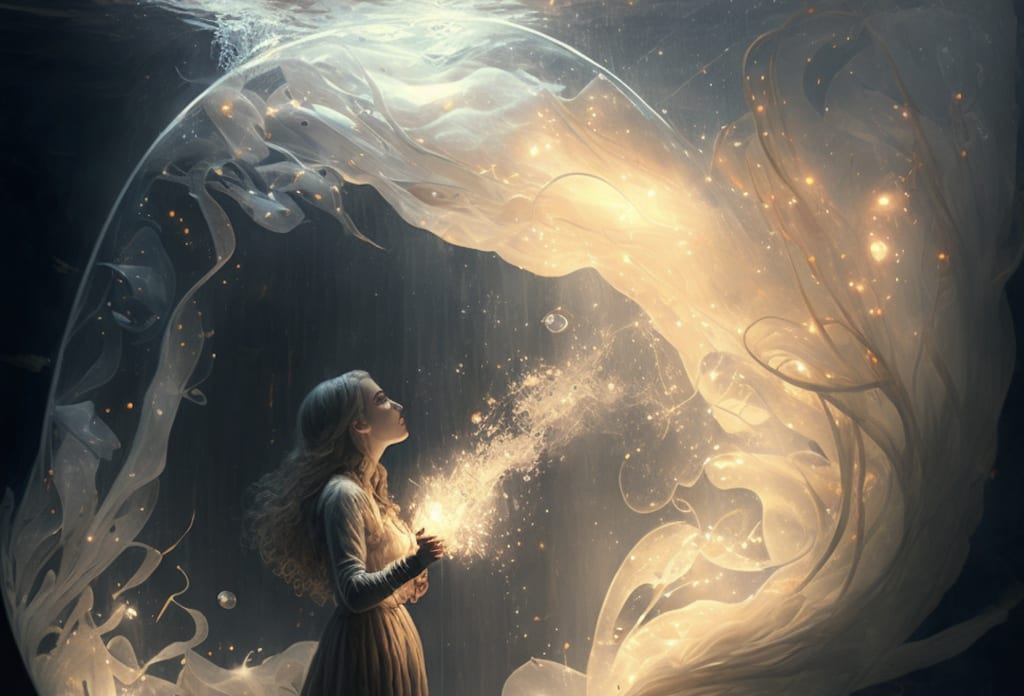
A writer's creative journey is never linear. Just like our characters, we experience everything from curiosity and excitement, to self-doubt and despair, only to restart the cycle a few days - or sometimes hours - later. Sound familiar?
I call this phenomenon the Writer's Heroic Journey. And no writer is immune from its effects.
In fact, over the last year and a half, I watched it play out again and again in various scenarios and severities in my writing community, Ockelwog. Currently, we have about 60 active members, but we've lost so very many more to the obstacles I'll talk about in this article.
With every writer who succumbed along the way, I was forced to say goodbye not only to someone I considered a friend but also to their characters, their worlds, and their creative minds. It was agonizing.
That's why I'm so glad you're here! Thanks for helping me curtail these painful patterns.
With this article, my aim is to be your cheerleader, to give you encouragement, and hopefully some inspiration, because I believe, with all my heart that you'll 'make it' - however you choose to define that.
Over the next few sections, I'll share what to look out for along the four stages of the Writer's Heroic Journey, and how the active members of the Ockelwog community manage to get to the next stage. I'll also share tips on how you can minimize the negative effects of each stage.
People far smarter and more accomplished than me have already written about the creative challenge, and I'm sure you've developed strategies of your own. This article is different in that it contains my personal observations and lessons from working with and alongside a few hundred writers over the last year and a half, and seeing what sets the most successful apart from the others.
If there is anything you feel I've missed here, I welcome you to share in the comments section of this article. Let's raise each other up together.
The Writer's Heroic Journey
As you may have guessed, the Writer's Heroic Journey is based on the monomyth or Hero's Journey narrative archetype popularised by writer Joseph Cambell.
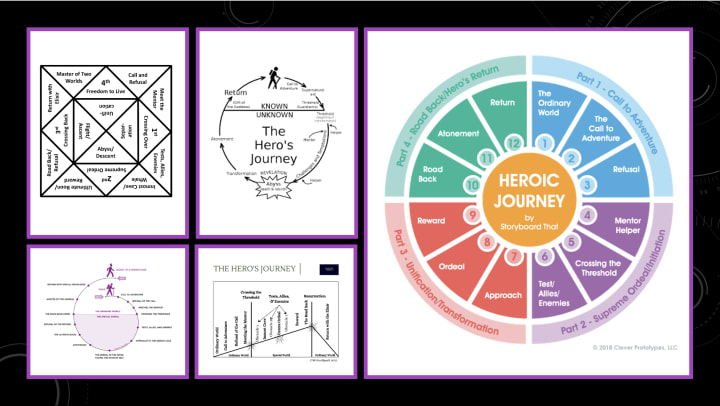
Since then, it's been represented in different forms. I've compiled a few from a cursory google image search (shown above). It's relatively well-known and widely used across media. In fact, many of the most successful books and movies follow this narrative structure.
Despite the many versions, at its core, the Hero's Journey is simple and follows a hero who:
- sets out on an adventure (Part 1: Call to Adventure)
- encounters seemingly insurmountable challenges (Part 2: Supreme Ordeal)
- learns and develops new skills (Part 3: Unification), and
- overcomes challenges to return home transformed (Part 4: The Hero's Return)
The writer in the Writer's Heroic Journey (or "WHJ") follows a very similar path.
First comes an idea and the excitement of getting started, then comes the self-doubt and the overwhelm of the project, then the painful, long days of plodding practice and perfection, and finally, eventually, if the writer is persistent, there's publication and starting again.
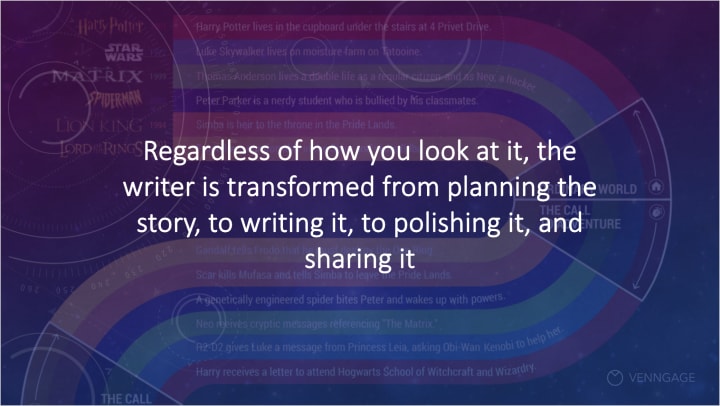
WHJ Stage 1: The Call to Adventure
I first became aware of this stage in the early days of Ockelwog. Back then, our members were writing their first novels. Although we were nervously excited about our stories, we shared one thing in common:
None of us believed we were good enough.
We were shy, private, reclusive writers. Lonely in our own worlds and quite unable to trust anyone to tell us the truth about our words. We second-guessed our second guesses, rewrote each beginning a dozen times, and more often than not, scrapped the whole thing. Some of us even got spooked when our peers liked what we wrote!
This was interesting since I was then, as I am now, constantly blown away by the creativity of our writers.
So, I'd stay up night after night to read and give feedback on 70+ budding novel ideas. It was as though encouraging each member to continue had become my mission. But my effort came at a terrible cost:
My heart broke whenever a talented writer quit.
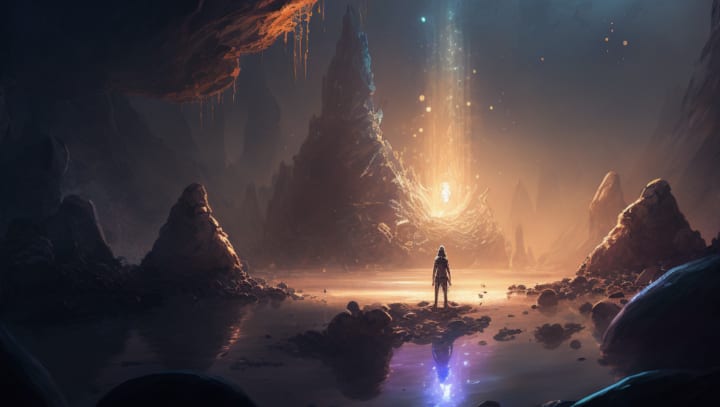
Every time they disappeared or said they were going to give up because they didn't believe that they were good enough, I'd be shocked and hurt. Why would they stop now? I'd rail. They were doing so well!
For months, I renewed my efforts to keep people from stopping, from giving up, and from quitting. And as I did, I began to notice patterns.
See, at Stage 1 of the WHJ, writers often feel that:
- their idea is so good and formed and vast in their minds, that they don't know where to start,
- they don't have the skill set to write the story they truly want to tell,
- their work would be judged by others (or stolen), so they'd rather keep it to themselves in their minds,
- as they progress, they have to start again, because their story, plot and characters develop in a different direction than the one they intended,
- the more they thought about their story, the less exciting it got and they became disillusioned.
Overcoming Stage 1 of the WHJ
It's easy to be nervously excited about a new project. And it's also easy to get stuck there without doing something about it. Here's what I mean:
The most successful and prolific writers in Ockelwog, take advantage of the excitement. They plan, jot down notes, and write out scenes or dialogue. They save it all in notebooks or digital documents. They understand that when inspiration strikes, their job is to milk it for all that it's worth.
Why?
Because there never is an end to inspiration.
Let me say that again: There is and never will be an end to inspiration.
One of the biggest and earliest mistakes new creators make is to believe that their current idea is the best idea and that they'll never think of something that good again.
Here's the truth, though: After that idea, there'll be another one and another one after that.
So, the most important way to overcome the challenges of Stage 1, is to get the idea, the words, the scenes, and the story down onto paper.
Now, you might be wondering, what if I'm wrong? What if your first idea is your best idea and you'll never have another as good?
I understand. I've been there more times than I care to admit because the WHJ restarts with every project.
Here's the answer: Talk with other writers who are on similar creative journies. I can't tell you the number of times I've seen stuck writers leave with energy and inspiration after an innovative, creative, out-of-the-box brainstorming session.
Notice that I said, "other writers who are on similar creative journies" and not just "other writers"? It's very tempting to group with writers who are more accomplished than you, or writers whom you admire. This won't always serve you best though, because they aren't currently on the same emotional trajectory as you, and their advice might be too out of sync with what you need.
Meanwhile, writers that are on a similar creative journey - those who are still on stage 1 of the WHJ - for example, will be working through many of the same hurdles you are facing. You'll be able to help each other and in the process, also build a peer group to write and succeed with.
After all, authors like Brandon Sanderson and J.R.R. Tolkien and many of the greats were in groups that helped each other to the top.
So, in summary, the tips to overcome Stage 1 of the WHJ are as follows:
- Just get started. Write it all down in whatever form it takes - don't worry about making it perfect yet. There'll be time for that later.
- Collaborate with writers who are on similar creative journies, and exchange new ideas during brainstorming sessions.
WJH Stage 2: Supreme Ordeal
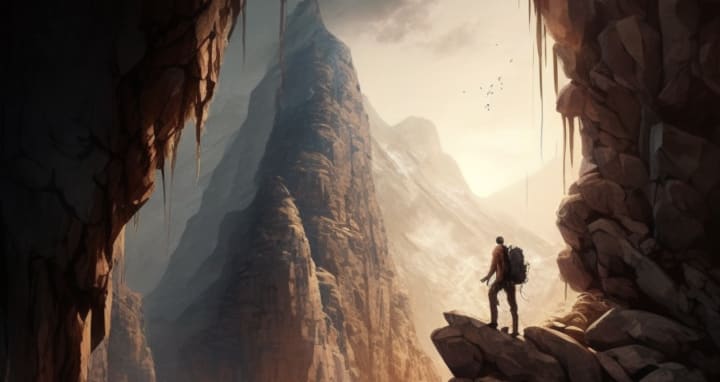
Many writers quit before reaching stage 2. Perhaps the excitement had worn off, perhaps they received feedback they didn't expect, or perhaps life just got in the way. For whatever reason, stage 2 of the WHJ truly is a supreme ordeal.
This is where, for a lot of Ockelwog members, self-doubt set in. Until then, they'd been swept up in the beginning of their stories, imagining the world, creating character sheets, and thinking through the overall story arc. Each of those things was still fun, still an exploration, still new.
But after that, once stage 2 began, they started to see and understand the vastness of their project. And they couldn't help but wonder whether they'd bitten off more than they could chew.
They looked around at other writers and admired their works so much that their mind's voice - the one that had been smothered by the excitement of stage 1 - grew louder to make itself known. I'll never be that good! I'll never make it! I'll never even finish... what am I even doing here?
Sound familiar?
I got stuck at this stage of the Writers Heroic Journey for several months as did many others. Some of the challenges we faced included:
- giving into self-doubt brought on by comparison,
- zooming in on minute details and letting them bog us down,
- allowing ourselves to feel the loneliness of being a writer (i.e. believing no one else could possibly understand our plight)
Overcoming Stage 2 of the WHJ
Making it through stage 2 is challenging. It requires a paradoxical mindset - one that is humble enough to be a student while also standing firm as an expert on one's own writing. It also requires patience and kindness. I have a specific example of what I mean.
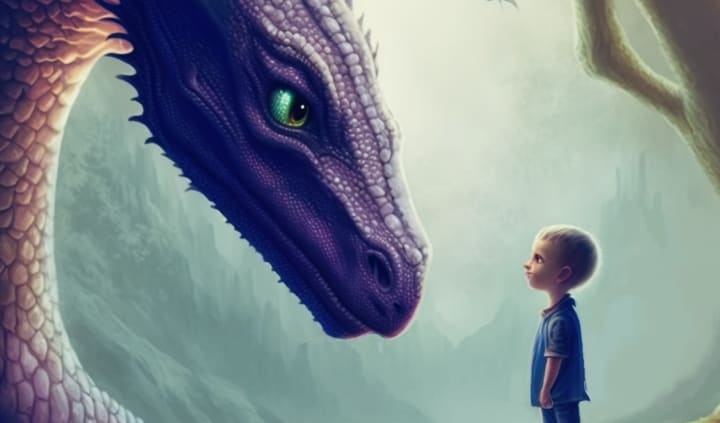
For the Vocal fantasy challenge about a dragon encountering a toddler, I really wanted to write something light-hearted and humorous. But my usual writing style draws heavily on descriptions of sensory details, often of things I've experienced. I can write serious, heart-warming, and heart-breaking.
But funny? I just didn't know where to start.
I tried anyway. I had a dragon swallowing a baby whole. That didn't work. Then, I had a dragon stealing a baby. And that really didn't work either. If you are interested, I'm happy to share a breakdown and analysis of those failed attempts in another article. Let me know in the comments if you'd like that.
Anyway, as time ran out, I realized that perhaps for that challenge, I just had to go with what I had. In the end, my submission, Blood of the Egg Snatchers, turned out to be very far from 'funny.'
But that was OK. I was proud of what I wrote. And, in my quest, I'd found some other authors whose humor I wanted to emulate. So, I began to study what made a scene light-hearted. What made it fun? I tried out different approaches, characters, stories, and settings, ever refining my understanding of what humor felt like.
Not long after, I managed to submit a story for another Vocal challenge that I felt was both light-hearted and fun, while also drawing on my personal experience and making it entirely my own. Behold, Such a Foreign Holiday: a short story about an immigrant family experiencing Halloween for the first time.
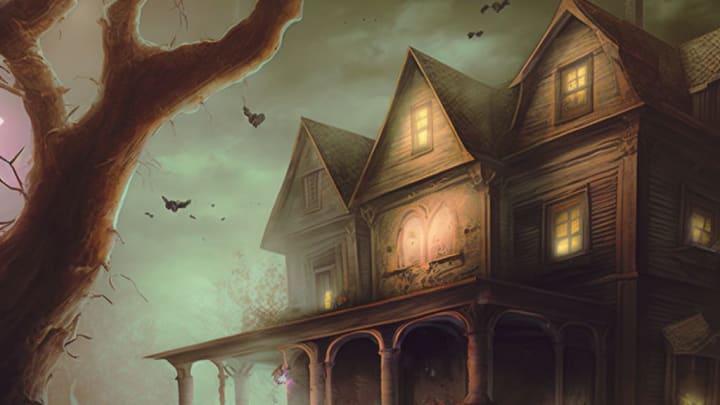
So, in summary, here are the tips to getting past stage 2 of the WHJ:
- Let comparisons be inspiring and educational, not competing and disheartening.
- Learn, try, practice, refine, then learn again. There is no wrong way to do this because you are the expert of your writing!
- Connect with other artists and creators who understand what you are going through. You truly are not alone on this journey.
By now, you're about halfway through the process. Be sure to celebrate each milestone because you deserve it! And then, let's head on to the next stage.
WHJ Stage 3: Unification
By the time your character gets to part 3 of the Hero's Journey, they are approaching the pinnacle of the story. This is where they come face to face with the story's biggest antagonist, a moment that will determine whether they succeed or fail.
In the Writer's Heroic Journey, then, stage 3 holds the biggest challenge. The vast majority of writers dropped off here as boredom, burnout, overwhelm, and exhaustion took center stage.
For most writers, this is where the act of writing feels more and more like work. Each word becomes a burden, a painful hurdle.
Many writers set their creative project aside at this stage and allow themselves to be drawn away from writing altogether, saying that they'll eventually come back to it when they're less busy.
But as we know, most don't.
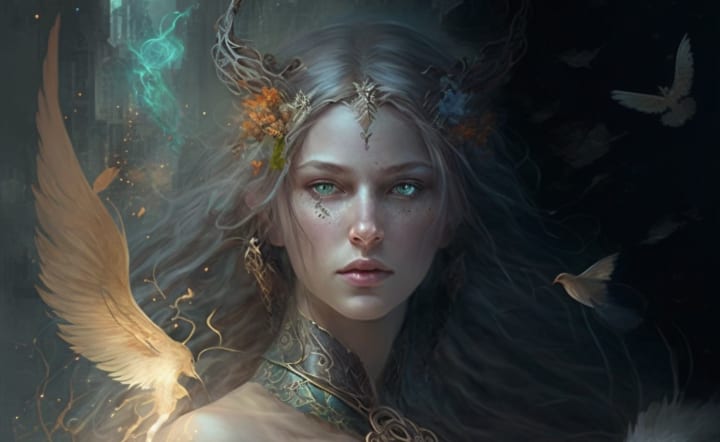
Overcoming Stage 3 of the WHJ
I only have one tip here, but it's a tremendously important one. Ready? Here it is:
Finish your story before you set it aside.
I really mean it. If you cannot bear the thought of plodding along on your story and you just want to stick it in a drawer and forget about it, take 60 minutes to wrap it up. Set a timer and know that it may very well be the last 60 minutes you ever spend on that piece of work.
During that time, be sure to get to the very last part of your story. Rush to get there. Summarise if you must.
Yes, I understand that that sounds nearly impossible. Maybe the plot is too tangled up to complete, and there are more unanswered questions than you can count.
Try your best anyway.
The important thing is that within the allotted time, you conclude your manuscript with a written 'The End.'
Then, you can set it aside. Or not.
Often, when writers use this method, they short-circuit the overwhelm that comes with imagining just how much work there still is to do on their story.
So, here's a pro tip:
When you're ready, read over your rushed ending. If it sounds good to you, set it aside for a while longer. If you are dissatisfied with it, set your timer for another 60 minutes and expand the plot points, adding details your story still needs. Then, stop after the time is up. Repeat as necessary until you are satisfied.
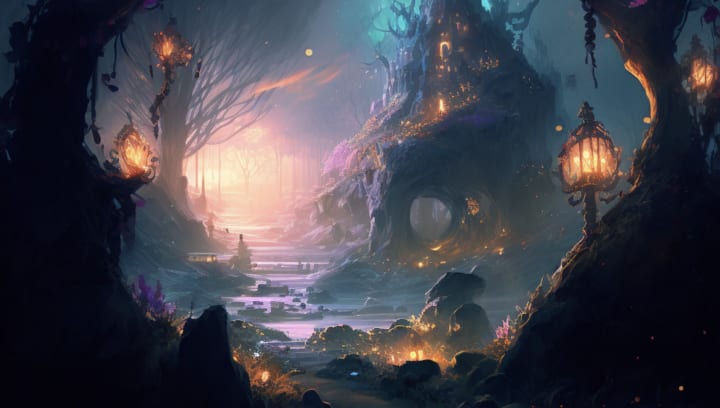
Writers who use this method to overcome stage 3 of the WHJ experience two additional powerful side effects:
1. They become better storytellers
In my experience, the hardest part of a writer's job is completing the story. Everything has to come together somehow - loose plot points have to be tied up, all the questions have to be answered, characters must have complete arcs. All while leaving the reader hungry for more. It's daunting to say the least.
This was one of the toughest things for me to learn. You see, when I began work on my novel, I re-wrote the beginning several dozen times. Every new writing changed the whole thing, making it near impossible for me to actually write more.
During Nanowrimo 2021, though, I rushed to "The End" - only then did I realize how I could better change the beginning and the middle. I'm now editing and polishing my second draft and my story is richer for it.
I certainly wasn't alone in facing this writing demon. Far too many incredible writers get stuck reworking the beginning. And they become excellent story starters.
But, the only way to get good at storytelling, is to complete a story, then start and complete another, until you naturally and easily think in complete stories rather than just beginnings.
2. They have a more seamless editing experience.
One of the coolest things about being creative is that our minds will puzzle on a problem even when we're not paying attention.
For example, when I was reworking the beginning of my novel, I came up with a hundred different ways to begin. But after I'd rushed to the end, using the tip we discussed above, I came up with a hundred different ways to solve the problems I was having before.
My mind had the whole story now, and a new perspective that opened up the world. I was able to look at my characters, my plot, my story with new eyes. And, believe it or not, I got excited about editing.
It's a wonderful feeling, and I hope that you experience it very often. Because it makes the editing process so much better, faster, and more fun.
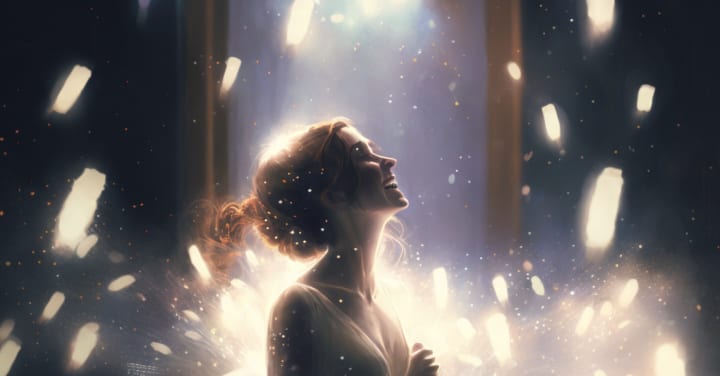
Besides, the moment you complete your first draft, your next two options unlock. Before I tell you about those though, I'd like to encourage you to set your manuscript aside for while. There are plenty of resources on why you should do so. Basically, you'll want to set your story aside long enough to look at it with fresh eyes.
And that's important because what you do next is what determines whether or not you complete the Writer's Heroic Journey.
WHJ Stage 4: The Hero's Return
The last two steps of Campbell's 17-step hero's journey are called 'Master of Two Worlds' and 'Freedom to live.' In other words, after the hero has faced their antagonist, they can pass between their new and past realities with ease. And, they are free of the initial challenge.
If you've made it to this stage, you are also very close to the end of your Writer's Heroic Journey. There's just one more decision you have to make:
- Start something new
- Polish and publish what have.
In my experience, the vast majority of writers choose #1.
Now, you might think there's nothing wrong with that, that it's perfectly OK to work on something new, and that you don't have to publish what you've written. And you'd be right. Except for one small thing:
It puts you back at stage 1 of the WHJ.
Overcoming Stage 4 of the WHJ
In stage 3, we talked about how writers who don't complete stories become great at writing beginnings. Well, writers who don't publish tend to become very good at starting new projects.
But, what do I mean by 'publish'?
I mean, share what you've created. You might submit to magazines, seek out an agent, or put it up on platforms like Vocal.
Believe me, I know that what I'm suggesting can be scary. For the longest time, I avoided sharing my words. What if people don't like what I have to say? What if my family and friends judge what I write?
But the only way to close the loop on the Writer's Heroic Journey is to get your work out there.
If you're not sure, I recommend getting started with Vocal contests. They tend to be short and varied enough in theme and genre that there is surely something you'd like to try.
Participating in Vocal's fantasy dragon challenge was a game-changer for many of us at Ockelwog. Oh, we wanted to share our words and works before, but many of us were too unsure about ourselves to publish anything. Once we did, though, three things changed:
- we realized it wasn't as hard as we'd imagined.
- we remembered that inspiration truly is endless.
- we were validated and rewarded for all our hard work and practice through the previous stages.
Take a look at the Fiction category on Vocal:
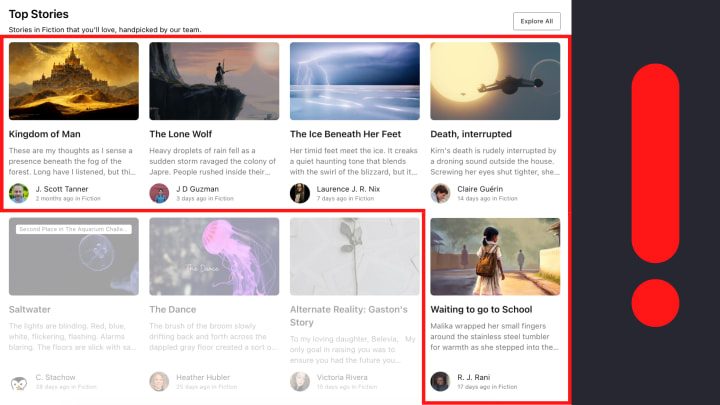
FIVE of the eight Top Stories are from Ockelwog members!
Which brings me to the last and final point in this article.
The biggest secret to success is community
As I mentioned at the beginning, Ockelwog had many more members than we do now. The writers who didn't stay inevitably weren't involved with the community. They didn't get to know each other, didn't write together, and didn't share their struggles or their victories. They opted to be wallflowers, and that's OK, really. Not every community is for everyone.
But success is almost directly correlated with participation and engagement.
I cannot tell you how many times the most engaged Ockelwog members have reached out to tell me that they wouldn't have written as much or published as much, or gained as much confidence as they did if they hadn't fully participated with the other writers in the community.
You are, of course, always welcome to see if you'd like to join us at Ockelwog.
But whatever community you might find yourself in - whether FB groups, writing forums, or other servers online or in person, I strongly encourage you to engage with your writing peers.
Share who you are as a writer and a creative, and you might quickly find yourself rising together with others on the Writer's Heroic Journey.
In the meantime, I look forward to meeting you in the comments section of this article. Here are some questions to help get you started: What stage of the Writer's Heroic Journey do you find yourself in? What was the most surprising thing you read today? What will you try next? What are your favorite writing strategies and tips?
Always in your corner and cheering you on,
R. J. Rani
About the Creator
Reader insights
Outstanding
Excellent work. Looking forward to reading more!
Top insights
Easy to read and follow
Well-structured & engaging content
On-point and relevant
Writing reflected the title & theme
Expert insights and opinions
Arguments were carefully researched and presented
Heartfelt and relatable
The story invoked strong personal emotions
Compelling and original writing
Creative use of language & vocab
Masterful proofreading
Zero grammar & spelling mistakes
Eye opening
Niche topic & fresh perspectives
Excellent storytelling
Original narrative & well developed characters



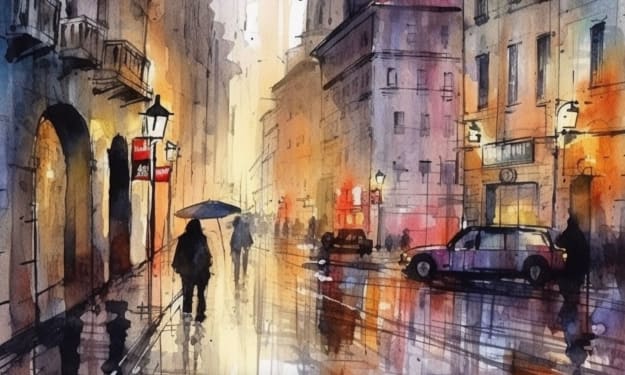



Comments (24)
Via RJ Rani Very well written, Love! Praise.Praising the heroes who loved the nation and contributed to humanity is a very useful and conscientious job.
I was fully invested with this article. You explained it in away that made me believe you are sharing and tru.y wanting to help others.
Wise words wonderfully written. Agree with your advice! 💖💖💕
Such great advice. And I love the way you tie in the aspects of the traditional hero journey with a writer's heroic jounrney. A point that resonated a lot with me was "the hardest part of a writer's job is completing the story."
I commented on this story 4 months ago and I didn't ❤️ it???? Fixed that right away!
Such a fun, entertaining, validating read! Thanks for offering this to the community.
This is an incredibly inspiring article. Very well done - I feel hopeful after reading this. :)
Gosh this just reads like a warm hug, and is refreshingly unalike a lot of the circulating advice for writers. Your passions for writing and for helping others are palpable! ♥️
Congratulation you gain one more subscriber. Really Really good article.
This is very inspiring, relatable, and helpful! Thank you for sharing!
Wow! This is an awesome article. There is so much fantastic advice and encouragement in here. Thank you for writing and sharing such a helpful resource!
I love the connection to the traditional Hero Journey. Mythology has always captivated me. Matter of fact, it was my love for mythology (and a focus on aspects of the Hero Journey) that helped me write my story "Rinthybal" (Labyrinth) which ended up a Runner-Up. Sometimes it does truly pay to just focus on what you love!
This comment has been deleted
Thank you for sharing and congratulations to you and to Ockelwog!
Awesome :) I just subscribed :) Really encouraging
Thank you for sharing such a well-written article.
You've already left such an impact on Vocal in such a short timeframe. Also, really love all of your artwork. Can't wait to see what you do next.
This was so informative and I 100% agree that community is key to the writer's journey. It's lonely work and whining about it to some others can be a real help. Thank you so much for the community you've created and for offering all us novices hope through this article!
This was wonderfully put together. I appreciated that you recognized and addressed facing challenges and then included realistic and practical advice in an upbeat, encouraging manner. Your group sounds wonderful, and I'd like to check it out! I laughed as my story was in the background of your one picture. Thank you for putting this together, sharing and being an amazing cheerleader for writers :)
Excellent piece here, and spot on with the details. I’ve found myself stuck quite often because of self doubt, even when others tell me how much they like it or love it. I love my writing community in part because they help me get over that. Thanks for sharing!
This is so informative and well done - packed with useful information! Thanks for sharing this! :)
very insightful article! Everything you say is so true. one thing that helped me personally was re-thinking what "failure" means - if I enjoyed the experience and grew as a writer and/or person because of it, there's no way it could actually be a failure even if I ended up hating and abandoning what I wrote. I think the point I'm rambling my way around to is that sometimes it helps to focus on the journey not the destintation. When I have doubts as to whether I'm good enough, convincing myself i really am can be tricky. Convincing myself that's it's worth trying anyway is easy!
Beautifully written and thought provoking. Thank you for the encouragement, it is well received!
This is all excellent advice. Having been on that journey myself, it all rings true. Our worst enemy in writing is self-doubt, and learning to manage that at every step of the process is essential. Peer groups help. Knowing you do not have to go it alone helps. Thank you for the article!
This was absolutely lovely, very inspiring while giving actionable points to tackle to move forward. <3